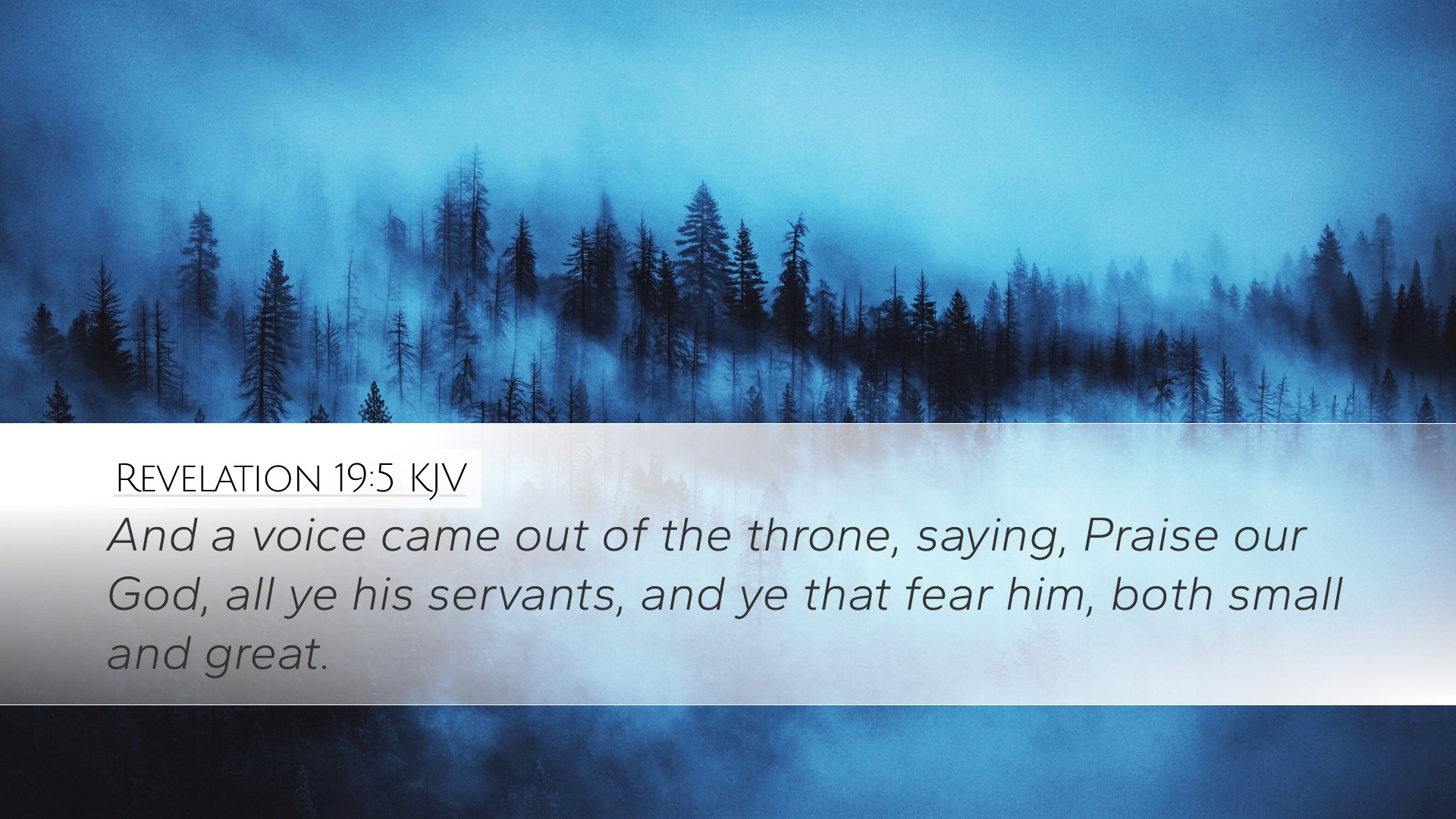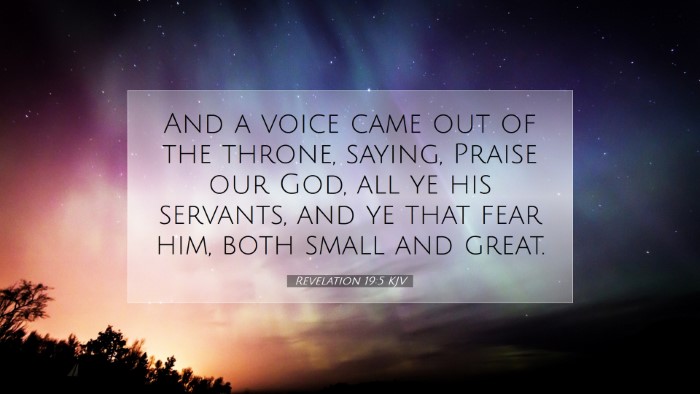Commentary on Revelation 19:5
Verse Text: "And a voice came out of the throne, saying, Praise our God, all ye his servants, and ye that fear him, both small and great."
Introduction
The verse Revelation 19:5 serves as a pivotal moment in the eschatological narrative of the Book of Revelation, illustrating the heavenly response to God’s ultimate triumph over evil. This moment reflects a chorus of praise that encapsulates the essence of worship and the recognition of God's sovereignty. Various public domain commentaries provide valuable insights into this verse, highlighting its theological significance and implications for ministry and personal faith.
Contextual Analysis
Revelation 19 marks the climax of the great tribulation, bringing forth a celebration of God's victory. To fully appreciate Revelation 19:5, it is critical to consider its surrounding context. This chapter begins with the proclamation of the fall of Babylon, representing the defeat of corrupt worldly powers (Revelation 18). The ensuing praise from heaven emphasizes the theme of divine justice and the restoration of God's glory.
Matthew Henry's Commentary
Henry emphasizes that the voice from the throne signifies divine authority speaking to the faithful. He interprets this as an invitation for all of God's servants to engage in worship, regardless of their status. His insights reinforce the idea that in the presence of God, earthly distinctions fade away. All who revere Him—"both small and great"—are called to eternal praise. This underscores the inclusivity of God's kingdom and the communal aspect of worship.
Albert Barnes' Commentary
Barnes provides a detailed exposition of the phrase "a voice came out of the throne." He notes that this is likely indicative of God’s direct communication through a speaker seated upon the throne, symbolizing the ultimate authority over the cosmos. His commentary further elaborates on the notion that "Praise our God" encapsulates the ultimate purpose of creation: to glorify God. For Barnes, this is not merely a call to worship but also a reminder of the acknowledgment of God's sovereignty and the joy found in servanthood.
Adam Clarke's Commentary
Clarke explores the implications of fear and reverence towards God present in this verse. He emphasizes that the phrase "ye that fear him" refers not only to awe but also to loyal obedience towards God. Clarke posits that genuine fear of the Lord leads to a life of faithfulness, thus creating a community of worshipers who acknowledge God's majesty and justice. His commentary invites readers to reflect on their relationship with God and how reverence can enhance personal worship.
Spiritual and Theological Insights
This verse encapsulates several key theological themes:
- God’s Sovereignty: The proclamation from the throne reaffirms God's supreme authority over all creation. This theme is vital for understanding the nature of divine rule in both the Old and New Testaments.
- The Nature of Worship: The call to praise illustrates that worship is both a personal and communal act. It encompasses all believers, inviting reflection on our role in the body of Christ.
- Inclusivity in God’s Kingdom: The differentiation of "small and great" points to the Kingdom of God as a realm where social distinctions are dissolved, emphasizing equal access to God's grace for believers of all statuses.
- The Role of Fear in Worship: The fear of the Lord inspires awe and reverence, resulting in a profound connection with God, shaping how we worship and engage in our spiritual lives.
Practical Application
For pastors, this verse highlights the importance of cultivating an environment of worship that encourages participation from all congregants. The communal aspect of worship should be emphasized in local church settings, promoting the idea that every believer has a role in glorifying God.
Students of theology can derive from this verse a deeper understanding of eschatological hope and the ultimate victory of Christ, reinforcing the essential tenets of their faith in a world that often appears chaotic and divided.
Theologians may draw upon this verse to explore the concept of divine justice and its implications for the practice of faith in contemporary society. The response of worship in the heavenly realm serves as a model for earthly worship practices.
Conclusion
Revelation 19:5 is a profound testimony of the worship and praise that emanates from God's throne. The collective call to worship invites believers into a deeper relationship with God, urging them to acknowledge His sovereignty and the significance of reverence and communal worship. The insights drawn from esteemed commentators illuminate this verse's rich theological truths, and practical applications can equip believers to live out their faith in ways that glorify God.


